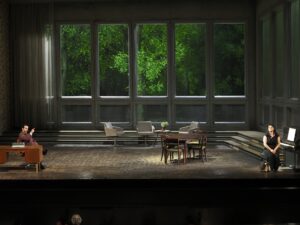
Teatro Nacional de São Carlos 2023-24 Review: Fidelio
By Ching ChangPhoto credit: © António Pedro Ferreira / São Carlos
This year marks the 50th anniversary of Portugal’s Carnation Revolution, a momentous historical event which brought down the totalitarian regime installed by fascist dictator Antonio Salazar in 1974. This bloodless revolution led the small Iberian nation on a path towards a modern, humanist and democratic European republic. This season many of the country’s largest performing arts presenters have geared up to offer programming on revolutionary themes, leading up to the springtime “Liberty Day” celebrations on April 25th for a national holiday.
In this spirit, the Teatro Nacional de São Carlos (TNSC) presented Beethoven’s “Fidelio” as its first full production of the year, with the TNSC resident forces led by British conductor Graeme Jenkins. This staging at the Centro Cultural de Belém’s Great Auditorium offered a new outing to Georges Delmon’s production (first seen in 2018 at Staatsoper Hamburg followed by a re-staging at the Teatro Communale di Bologna in 2019), showcasing ingenious architectural sets designed by Kaspar Zwimpfer.
The curtain opened upon an attractive domestic open space floor plan, with furnishings, a desk with a typewriter, and a clunky old piano to the side, where we hear Marzelline’s painful attempts at practicing “Für Elise.” Realistic digital projections of lush woods and greenery could be seen through the large windows outside, representing ideal freedom, a view which incidentally had an uncanny resemblance to Lisbon’s cherished concert venue at the Gulbenkian Foundation, its great auditorium with large windows behind the stage revealing dramatic views of the luscious gardens.
Visually impactful as it was, Delmon’s production flaunted flawed logic unapologetically in order to render the production’s Kafkaesque microcosm, suggesting that this is a prison created out of the mundanity of modern urban lives where everyone is oppressed, while also being an oppressor. And of course, since it is after all a German Konzept production, it contained the inevitable hors-libretto scene of gratuitous sexual violence, a plot twist left unresolved, when a frustrated Jacquino assaults Marzelline, an act that was only arrested by the sudden appearance of Rocco.
Headlining the cast was soprano Gabriela Scherer as Leonore; partnered by tenor Maximilian Schmitt as Florestan. Scherer is a committed performer, but proved to be frustrating during some of the key moments. She excelled in the ensembles, such as in the duet “O Namenlose Freude” with Florestan, or the jeweled, touching quartet “Mir ist so wunderbar;” yet she failed to catch the urgency of the explosive “Abscheulicher.” Leonore’s ascending vocalises seemed inexplicably contained, offering little sense of hope or the spaciousness of an anticipated idealized liberty.
A late replacement for Nikolai Shukoff (who withdrew from the production due to unspecified family reasons), tenor Maximilian Schmitt excelled in a deeply psychological portrayal of Florestan, singing with a combination of potent and handsome vocalism while depicting the tortured mental quagmire of a character being held against his will.
The charismatic Australian bass Joshua Bloom was an outstanding Rocco, capturing the conflicted humanity of the multi-tasking character with a warm, room-filling resonance. As Don Pizarro, Israeli bass Boaz Daniel was a bit vocally outmatched by Bloom’s Rocco, but otherwise made a credible effort in capturing the menace of the corrupt and power tripping governor. The minister Don Fernando was efficiently portrayed and authoritatively sung by Romanian bass Levante Páll. The supporting roles of Jacquino and Marzelline were assigned to two of the São Carlos veterans, tenor Leonel Pinheiro and soprano Susana Gaspar, both of whom are house favorites and skilled singing actors.
Graeme Jenkins extracted a superlative performance from the Orquestra Sinfónica Portuguesa (TNSC’s resident orchestra), with purposeful tone, rhythmic precision and an infectious energy, particularly in Fidelio’s long Beethovenian finale. This ensemble has a heavy workload on its calendar, and can be something of a hit-or-miss. So cynical long time patrons will slyly tell you that this orchestra seems to play better and more attentively under international guest conductors than under local maestri. In my limited experience with the orchestra, this accusation does not seem very fair, but given the caliber of this performance, one could be forgiven for thinking that it could have been the case in this instance.
Above all, the TNSC opera chorus, prepared by Giampaolo Vessella, was superb in rendering the taxing chorus assignments in this opera, particularly in the energetic, triumphant final chorus, “Wer ein holdes Weib errungen” crowned with the jubilant “Retterin des Gatten sein.” Also, the luminous prisoner’s chorus was exquisitely rendered, touchingly shaped and crafted, punctuated by the two marvelous and all too brief incidental solos by tenor Sergio Martins and bass Nuno Dias.
This “Fidelio” is but the first of TNSC’s handful of offerings on revolutionary themes this season, which will include works by two of the foremost Portuguese composers: Joly Braga Santos’ “Trilogia das Barcas” and Fernando Lopes Graça’s “Requiem for the Victims of Fascism in Portugal,” Op. 210.



